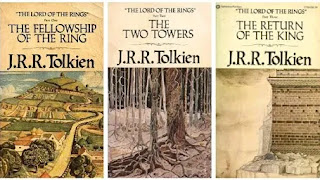Wednesday, August 9, 2023
Wednesday Comics: DC, November 1982 (week 2)
Monday, August 7, 2023
Lord of the Rings and the Beginning of "Serious" Fantasy
Hear me out!
I'm aware, course, that there are many works that we would now call fantasy that predate Lord of the Rings, but the conception of fantasy as a specific genre post-dates those works. The conception of fantasy as a genre grew out of fairy stories, and so what I mean here is a work distinct from fairy tale that nevertheless contains the elements of fairy tales: elves, dwarves, dragons, etc. The works of Howard, Smith, and others would be been thought of as adventure stories, weird tales, and the like when first published.
Even still, there are older works that that meet that criteria: MacDonald's The Princess and the Goblin, some of Baum's works, and Dunsany's. But all the works I can think of that do they aren't obviously children's works have strong elements of whimsy, irony, and often outright humor. Even Tolkien's own The Hobbit could be so characterized. Lord of the Rings, while not humorless, is much more serious business, though perhaps not as much as Anderson's The Broken Sword, which closely follows it.
Did this seriousness play a role in it's centrality to the emerging genre? I think a bit, though it might be easy to overstate the importance of that one factor. I do think that with Howard and Tolkien sort of being the prevailing template for fantasy has served to influence the tone of a lot of works that followed and the games that inspired them.
Friday, August 4, 2023
Things to Read If the Spirit Moves You
I've gotten into 2 good fantasy novels with connections to British esoteric spiritual belief at the turn of the 20th Century which are both good reads and good gaming inspiration.
Summerland by Hannu Rajaniemi
I've praised Rajaniemi's science fiction work before. Here he goes for an alt-history and alternate physics in a spy-fi story set in 1938 were Summerland (the 4-dimensional space where the dead go) s being exploited with etheric technology and Britain and the Soviet Union are involved in an escalating proxy war in the Spanish Revolution. Behind all that are mysteries regarding the afterlife: where do souls come from? And why isn't Summerland full of ghostly civilizations? (Not all these questions are answered!) The spy stuff reminds me of a couple of novels by Tim Powers (particularly Declare) but the very science fictional rigor applied to the mechanics of afterlife physics is all Rajaniemi's own.
The Revolutions by Felix Gilman
Gilman is another author I've praised previously. In this one, a young couple in Victorian London gets involved in an attempt by a occult cabal's ambitious attempt to visit Mars by means of astral projection, but in doing so they make themselves targets in a magical war being waged between occult societies. One of the highlights here for me is how magic is portrayed in a way that is powerful, but somewhat subtle. A duel between magicians involves bystanders controlled or charmed into hurling insults or punches rather than mages hurling bolts of glowing energy.
Thursday, August 3, 2023
Weird Revisited: Combat as Bloodsport
A common reframe in the old school landscape is "Combat as War vs. Combat as Sport," often used to negatively contrast elements of 5e and particularly 4e concerned with encounter balance and "the encounter" as a fundamental unit of game action in general with the old school. Without getting into the merits of how this argument is typically framed, I think that even if we accept this as true, there is a way to lean into those elements of modern D&D and come out with something cool. Instead dungeoncrawling for treasure (mainly), maybe the dungeon environment could be the battleground of a big tournament.
X-Crawl deals with some of this territory, I guess, but from what I read of it, it is set in the modern day, and seems very much concerned with the celebrity aspect of things, bringing in a lot of professional athlete cliches. All well and good, but I'm more interested in something more like Dragonball Z. The fighters are in it often for the personal betterment--a personal betterment that is practically apotheosis, which dovetails nicely with D&D advancement. What if the gods or immortals or whatever design the dungeons as tournament grounds, and foundries to forge new exalted beings to join their ranks?
In this context, the lack of XP for gold makes perfect sense. Also, "levels" of dungeons are like brackets of a tournament. In order to give a good spectacle, you don't want scrubs advancing to take on the contenders too soon. Mainly playing this sort of setting would just mean thinking about the game differently. The only change might be that there wouldn't be any nameless rabble or humanoid tribes with kids and the like. Everybody in the dungeon is playing the game!































.jpg)






